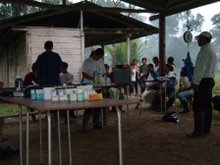One of the assigned articles in our class on public health challenges in China recounts the story of Rongrong, a newborn baby whose parents were among villagers sold fake milk powder to feed their infants in 2004. At least 200 infants were severely malnourished as a result of consuming this cheap powder, and village doctors, who aren't rigorously trained or regulated, failed to recognize the signs of malnutrition. Instead, they called it the "big head disease"--a classic indication of malnutrition. Rongrong died in a city hospital. Her parents are responsible not only for the cost of her care prior to her death, but also for the illnesses her mother now suffers.
According to China Daily, rural people are most susceptible to counterfeit food products, where there is very little regulation. Companies wanting to turn a profit have apparently found their target population in China's most precarious citizens. Not only that, what kind of physicians fail to diagnose severe malnutrition?
The original article, published in The Economist, can be found here.
Learn more about the unexpected, adverse outcomes of globalization on the "have-nots": The UN Development Project's report on "Inequality & Development"
Making the case for capitalism: John Norberg video
Compounding the issue: Another video on politics, wealth, and health
Sunday, January 28, 2007
Subscribe to:
Post Comments (Atom)





1 comment:
Its sad, with capitalism comes profiteering and people cutting corners to increase margins. The solution in China I think, before its to late, is to have education programs for aspiring entrepreneurs to help them realize that making money can be done in ways that are beneficial to there consumers. Teaching them the concept of value add and marketing to increase their margins rather than substituting inferior materials in their products. Thanks for the post it, the article was really interesting.
Post a Comment